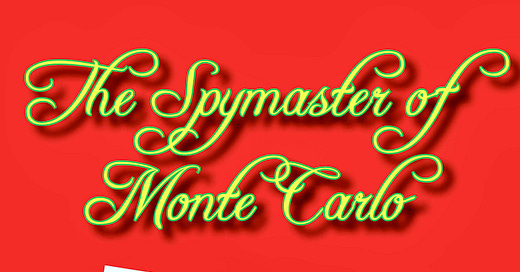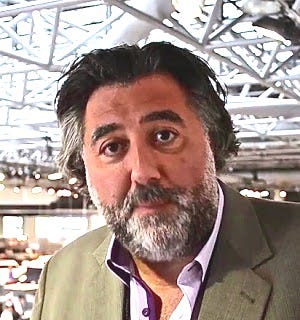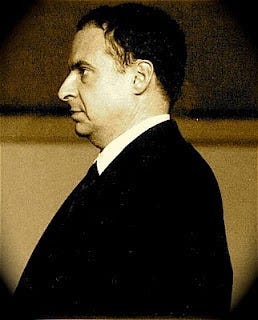THE SPYMASTER OF MONTE CARLO: 22) THE REUBEN CONSPIRACY
A Throwback Thursday Memoir of Intrigue & Lunacy
June 2005
The Russian Sergey (“FSB”) and translator/girlfriend Oksana hung around Monaco for a couple days after meeting Prince Albert.
Oksana requested I plant myself outside Hotel Negresco’s entrance at ten past twelve noon precisely on Sunday, June 5th.
I arrived; they were 20 minutes late (so much for punctuality, a tenet of good intelligence work). Sergey was wearing the same boating togs from two days before.
Their driver, Olivier, a Frenchman (probably a DST informant) drove a large black Mercedes with Monaco tags.
I climbed into the backseat with Oksana and, to the soothing strains of Rachmaninoff, we rolled to St. Paul de Vence.
Sergey turned to face me. “Are you comfortable?”
(This is what KGB Chairman Vladimir Kryuchkov would ask traitors, in person, the night before their executions.)
“Yes, thanks.”
Sergey was less concerned about Oksana’s comfort.
Although she was wearing stiletto heels, Sergey made her walk the perimeter of St. Paul, up and down stairs, on mostly cobble-stoned streets, as he serenaded me with platitudes couched as profundity.
We drove on to Cap d’Antibes—and a highly regarded Michelin-starred restaurant called Bacon where, he told me, he had dined a number of times over the past ten years.
Here was a Russian government official living like an oligarch, paying everything in cash, which Oksana produced in thick wads.
He bossed the restaurant’s staff so rudely, I thought for sure they’d find a way to sabotage his meal.
I ordered ravioli stuffed with loup (sea bass) and truffle in a pepper cream sauce, followed by bouillabaisse, which may be the best I’ve ever had, perfectly paired with Montrachet chardonnay.
I asked Sergey if he thought he was under surveillance. He told me they (the French) watched him only the first day. “The driver thinks we are rich Russians who want to buy a villa.”
What if the driver is a French agent? I posed.
“If he’s a problem,” Sergey growled with bravado, “he’ll end up in a forest. Or a desert.”Then he cracked spiny lobster shells with his teeth and revealed “the two biggest threats facing Albert and Monaco”:
1) Prominent Monegasque families.
2) The French.
Corrupt deals, he said, were intermingled between both categories.
(He wasn’t wrong.)
He told me the French special services kept close tabs on the prince wherever he traveled, whatever he did.
“Someone with a very close position to the prince reports everything to the French,” he added. “And very fast.”
It was easy for me to guess who.
I mentioned the name Jean-Paul Carteron.
Sergey perked up and fingered Carteron as the link between Bulgarian organized crime and the Bulgarian prime minister, which helped validate a tenuous report we’d received earlier from another dialed-in source.
Sergey grew solemn and referred to “dark forces in France, Italy, and Germany who want to unseat Prince Albert and replace him with [Princess] Caroline and [her husband] Ernst.”
Not a short-term project, he said, but one that would evolve over the next few years.
Sergey told me that “one-third of Monaco’s government want to see Prince Albert fail.”
And he specifically requested I convey this message to the prince: The danger comes from those closest to you.
It is vitally important, he added, that the prince demonstrate strong leadership early on to prevent the French government and prominent Monegasque families from running Monaco.
(A message I’d been striving to drive into Albert.)
We drove silently in dense traffic back to Hotel Hermitage, where I got out and said goodbye. Sergey said he’d call and we’d meet again soon.
I turned to leave but the driver insisted that he drive me wherever I wanted to go.
I said, “No thanks, I’ll walk.”
At which point he became very insistent, almost demanding that he drive me onward. It was actually comical.
I declined—and dry-cleaned my trail back to M-Base.
At ten o’clock next morning, I met with Jean-Raymond Gottlieb, to whom Prince Albert referred me for police support.
Gottlieb was part of SIGER, Monaco’s three-officer political intelligence unit.
We had a favorable first meeting and established a good rapport.
Even though Gottlieb had a personal connection to the royal family, having fathered Princess Stephanie’s eldest daughter, protocol dictated that he could not contact the prince directly with police business.
So he was extremely pleased that I would be a natural conduit for information his unit possessed and Albert.
Protocol dictated that Gottlieb could not contact the prince directly, even though he had a personal connection to the royal family, having fathered Princess Stephanie’s eldest daughter. So he was extremely please that I would be a natural conduit for information his unit possessed and Albert.
That’s because others in the official chain filtered intelligence to suit their own agendas and nothing of significance from Gottlieb ever reached the Palace.
We immediately joined forces on the investigation into Franck Biancheri’s corrupt activities.
Gottlieb was also aware of aide-de-camp Bruno Philipponnat’s impropriety and alleged kickbacks.
In addition, we discussed our mutual concern about some of the prince’s “friends”: Carl Carlsson, Gocha Arivadze—and Dr. Michael McNamara, the latter alleged to have beaten girlfriends and threatened them with expulsion from Monaco should they dare complain, citing his close friendship with Albert.
Early that afternoon, CIA delivered an industrial-strength shredder to M-Base.
Afterwards, I hosted a meeting of the prince’s long-time friends—Mike Powers, Francesco Bongiovanni, and Jean-Marc G—to hear their concerns about corruption.
They resolved to bring Stephane Valeri, President of the Conseil Nationale, to M-Base to voice his own concerns directly to me.
Not two hours later, Monaco’s highest elected official appeared on my doorstep.
President Valeri explained to me how he’d lunched with Franck Biancheri two weeks before, at which time—he told me—he’d had offered the finance minister an opportunity to admit his mistakes. Biancheri rebuffed him. So Valeri categorically revealed to me the muck he had raked on his fellow Monegasque.
As he prepared to leave M-Base, Valeri held his hands in prayer and implored of me, “Please save my country.”
I would have been complimented.
Except I knew what Valeri really meant: Please help me quash my political enemies.
That evening, I met again with Jean-Raymond Gottlieb. He brought with him his SIGER unit partner, Yves Subraud, a captain with 28 years on Monaco’s police force.
Subraud had special responsibility for monitoring the Islamic fundamentalist community in and around the principality. He echoed Gottlieb’s pleasure about having a direct route to the prince through our special service.
“Nothing ever gets through,” Subraud told me. “Thank God someone can now get the message across.”
We discussed Biancheri, my original reason for needing a police contact.
“Valeri has dirt on Biancheri and Biancheri has dirt on Valeri,” explained Subraud. “They had lunch two weeks ago and each told the other of their desires,” he confirmed. “They made an agreement to keep each other’s dirt secret.”
It hadn’t taken Valeri long to break their agreement.
Said Gottlieb: “Tomorrow we go to work for you.”
Two days later, back in London, I met Ian M at the bar of the Sherlock Holmes Hotel on Baker Street.
He thought Sergey’s assessment about what Prince Albert should be concerned about was spot on.
“Albert has one whack at getting it right from the get-go,” said Ian. “He needs to clean house.”
I returned to Monaco two days later, June 11th, for meetings with operatives and assets, and to brief the prince.
Though I presented myself at the residence entrance, as stipulated by Albert, the Carabinieri (Palace Guard) sent me to the wood-paneled waiting room, where passage of time is slowed and accentuated by the ticking of an old clock.
When I was summoned to Albert’s private parlor 75 minutes later, the Prince apologized. “They don’t know what they’re doing around here—they should have brought you here and given you something to drink.”
We faced one another in a pair of wing chairs beneath a high ceiling and picture window looking toward the Tete de Chien.
“This may be our most important meeting yet,” I began. “There is too much smoke to appoint Franck Biancheri chef de cabinet. And probably grounds to remove him as finance minister.”
I worked my way through a number of alleged transgressions, ranging from conflicts of interest to secret kickbacks to outright fraud.
The prince confided something he claimed he had not told another soul: he’d decided to appoint someone other than Biancheri as his chef-de-cabinet.
Albert wanted me to provide all the ammunition I could muster. He intended, he told me, to announce his intentions on July 13th, the day after his investiture. And he anticipated an onslaught of indignation from Biancheri and his allies in the government.
I reemphasized the importance of making the right personnel decisions up front in order to make a bold statement that the corrupt status quo was no longer acceptable, and that the prince was firmly in control of his principality.
I suggested a zero based review, whereby everyone in official positions would be required to offer their resignations pending review of their records by a new chef-de- cabinet.
The important thing, I advised, was for the prince to flex muscle and exert power, not cower away from making dramatic decisions against the status quo.
The less power the prince exerted, I emphasized, the greater the opening he would provide for others to chip away at his authority.
With hindsight, it was probably a mistake for the intelligence apparatus I had created to delve into internal corruption. This was a police matter; law enforcement, not intelligence.
But as the prince himself pointed out to me in defense of issuing these requirements: a) the police had not been doing its job properly, b) he did not trust the police, and c) whatever police reports were issued to the interior ministry were either filtered or blocked entirely from reaching him.
Morale within the police force was at an all time low with many in its ranks complaining about their alcoholic chief.
Little wonder Gottlieb and Subraud were thrilled by the relationship we’d just established.
With regard to CIA issues: If ever there were an Islamic terror incident in Monaco (of huge concern to Captain Subraud), we now knew exactly what real estate in the principality to seize based on who owned it.
Quipped the prince: “We’ll have M-Bases everywhere!”
With these more substantive issues out the way, I regaled Albert with FLOATER’s latest Operation Hound Dog exploits.
More journalists and sources had been met, providing us with hard information about who leaked what from the prince’s royal court.
And, of course, FLOATER’s recent meeting with Paris Clique clowns Steven Saltzman and Thierry Lacoste in the French capital.
I read FLOATER’s report aloud:
A bizarre situation from the start with Steven Saltzman (SS). He’s loud, rude, aggressive, obnoxious and overbearing. SS played the dominant role while Thierry Lacoste (TL) patiently listened to me and played off SS’s commentary. SS took the meeting as a way of assessing if he, with TL’s assistance, could take control of the project under an “authorized” agreement. “Listen,” said SS loudly, “you can do this two ways. The first is make this an authorized biography for which Thierry will write a legal agreement that gives him full editorial approval, including galley proofs. In return, you get access to extraordinary sources, some of which have never been heard from before. You also get access to the subject of your book.”
“You could have an attorney,” TL interjected, implying that going forward was based upon retaining him for a fee. “Or you can go the unauthorized way, which means you’ll get nothing from me or anyone else who asks the Palace if this has approval.” Trying to ingratiate myself, without committing this project to them, I said I would not travel to Togo to exploit recent news coverage about Nicole Coste and her son. TL smirked at SS and said, “Well maybe you should.”
Next, I conveyed Sergey’s caution about “dark forces in Europe who want Caroline and Ernst” running Monaco instead of Albert, mostly to gauge the prince’s reaction.
To my surprise, he did not scoff.
We agreed the weakest link in the prince’s travel security was his helicopter.
“I use it as little as possible,” he said quietly.
A few days later, at Sergey’s request, I flew to Frankfurt to meet with him. He and Oksana met me at the airport with a large black Mercedes and driver.
We steered away from the city to Schlosshotel Kronberg, a German version of the Chevy Chase Club.
Posturing himself as a lover of nature, Sergey insisted on a long stroll through the grounds, part landscaped, part wild. About our Serbian target, he said, “Bad man, arms deals. I can get rid of him in two months if you want.”
I did not want Sergey to get rid of anyone, though his Mafiosi-like language amused me.
As much as I would have preferred a frankfurter and sauerkraut, we sat down to a gourmet meal of scallops and cucumber followed by veal with foie gras, lubricated by a bottle of fine Riesling.
Sipping carrot juice and cream, Sergey told me he had not seen President Putin between our first meeting in Monaco and now (two weeks later), “but he knows and approves.”
Oksana paid cash for everything.
In the next breath, Sergey told me that Monaco-based Brit Simon Reuben connects to “those Reubens in the United States.”
“What Reubens in the United States?” I asked.
“The State Department and the finance minister,” replied Sergey.
Huh?
Sergey was suggesting that former State Department spokesman James Rubin and U.S. Treasury Secretary Robert Ruben were all related in one huge Reuben Conspiracy.
Is Sergey wacko or what? I scribbled into my journal.
Ian M later explained it away as an expression of old-school Russian antisemitism.






